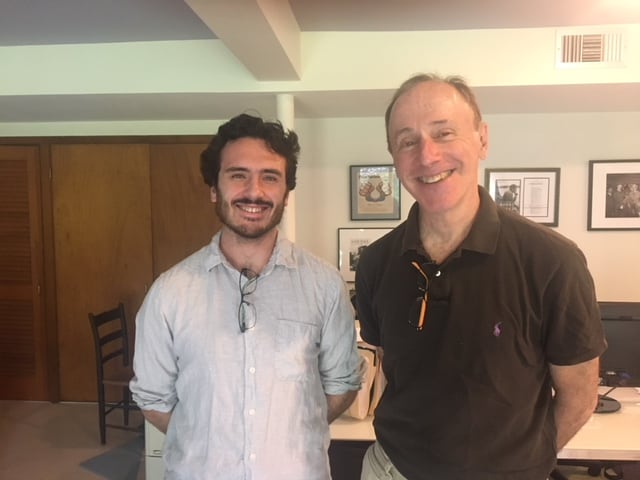Summer Internship with Boston-Based Author Offers Experience in Humanities Research
 Hartford, Connecticut, August 22, 2018—Trinity College student Ben Gambuzza ’20, from Plymouth, Massachusetts, interned this summer with an author working on a book about Republican U.S. Senator Joseph McCarthy, whose anti-communist crusade shocked the country in the early 1950s. Gambuzza’s paid internship was with author Larry Tye, a former Boston Globe reporter who has published six previous books, including a biography, Bobby Kennedy: The Making of a Liberal Icon, and Shock, a collaboration with Kitty Dukakis on the subject of electro-convulsive therapy (ECT).
Hartford, Connecticut, August 22, 2018—Trinity College student Ben Gambuzza ’20, from Plymouth, Massachusetts, interned this summer with an author working on a book about Republican U.S. Senator Joseph McCarthy, whose anti-communist crusade shocked the country in the early 1950s. Gambuzza’s paid internship was with author Larry Tye, a former Boston Globe reporter who has published six previous books, including a biography, Bobby Kennedy: The Making of a Liberal Icon, and Shock, a collaboration with Kitty Dukakis on the subject of electro-convulsive therapy (ECT).
A double major in English literature and music, Gambuzza serves as editor-in-chief of the Trinity Tripod and is a member of the Fred Pfeil Community project (“The Fred”). He plays piano in the Music Department’s chamber ensembles, takes private lessons, and performs off-campus. Gambuzza said he was drawn to Trinity, in large part, by the college’s academic rigor and the close student-professor relationships. Below, he shares some of his experiences from his summer internship.
Why did you choose this internship?
I didn’t choose the job because I was interested in Joseph McCarthy or even modern American history. I never anticipated being involved in the subject. I chose the job because I wanted to know first-hand what “research” meant in the humanities. I also wanted to experience how an author takes massive amounts of information and boils it all down into one line of thinking and argument that governs the whole book. And I was up for a challenge; the job exceeded this expectation. Little did I know the puzzles I would have to work out or the amount of historical information I would have to process.
What were your daily responsibilities interning with author Larry Tye?
Part of what made this job exciting was that I never knew what my research task would be for the day. Sometimes I would wake up and have to find an obscure magazine article on Joseph McCarthy, from a magazine that ceased publication in 1970. Other times I would have to call the Library of Congress or the New York Public Library archives and work with them to find an artifact in their collection. Other responsibilities included contacting people who knew McCarthy, or whose ancestors knew McCarthy, and would like to share stories, and travelling to the Trinity, Harvard, or Yale libraries to look through old microfilm. And, throughout the whole summer, I worked on compiling the bibliography for the end of the book.
What was the most challenging part of this internship?
Most challenging was getting around a brick wall that I sometimes hit in my research. Sometimes, no matter how hard I looked, it seemed I would never find the newspaper article, speech, or phone number that we needed. Patience is what counts at a research internship like this. It is a little like fishing; you frustratingly drag your line all over the Internet failing to find fish, but when you least expect it, you feel a nibble. Also challenging was striking the right tone with people, such as librarians and government officials, so that they will help you without getting annoyed that you’re asking.
How was this internship experience useful to you?
This internship really proved to me how history is always relevant to the present. I learned that despite the circumstances or time, behavior of individuals and the reactions from the public are constantly paralleled, decade after decade. And although the subject matter does not directly connect with my studies in English literature and music, both of these disciplines must take history into account. I learned that if you know the history of anything better, especially of a country, you’ll have a much deeper understanding of the present, its literature, and its culture.
How has this internship sharpened your skills?
Overall, I know how to use my resources better. Through calling sources, using databases, and navigating different universities, I learned how to adapt to get the information I needed. And emphatically, I learned how valuable the Trinity library and its librarians are. The whole building, especially the great Jeff Liszka, arts and humanities librarian, helped me throughout the summer to find anything under the sun, or get me access to resources that I wouldn’t have otherwise without the Trinity connection.
